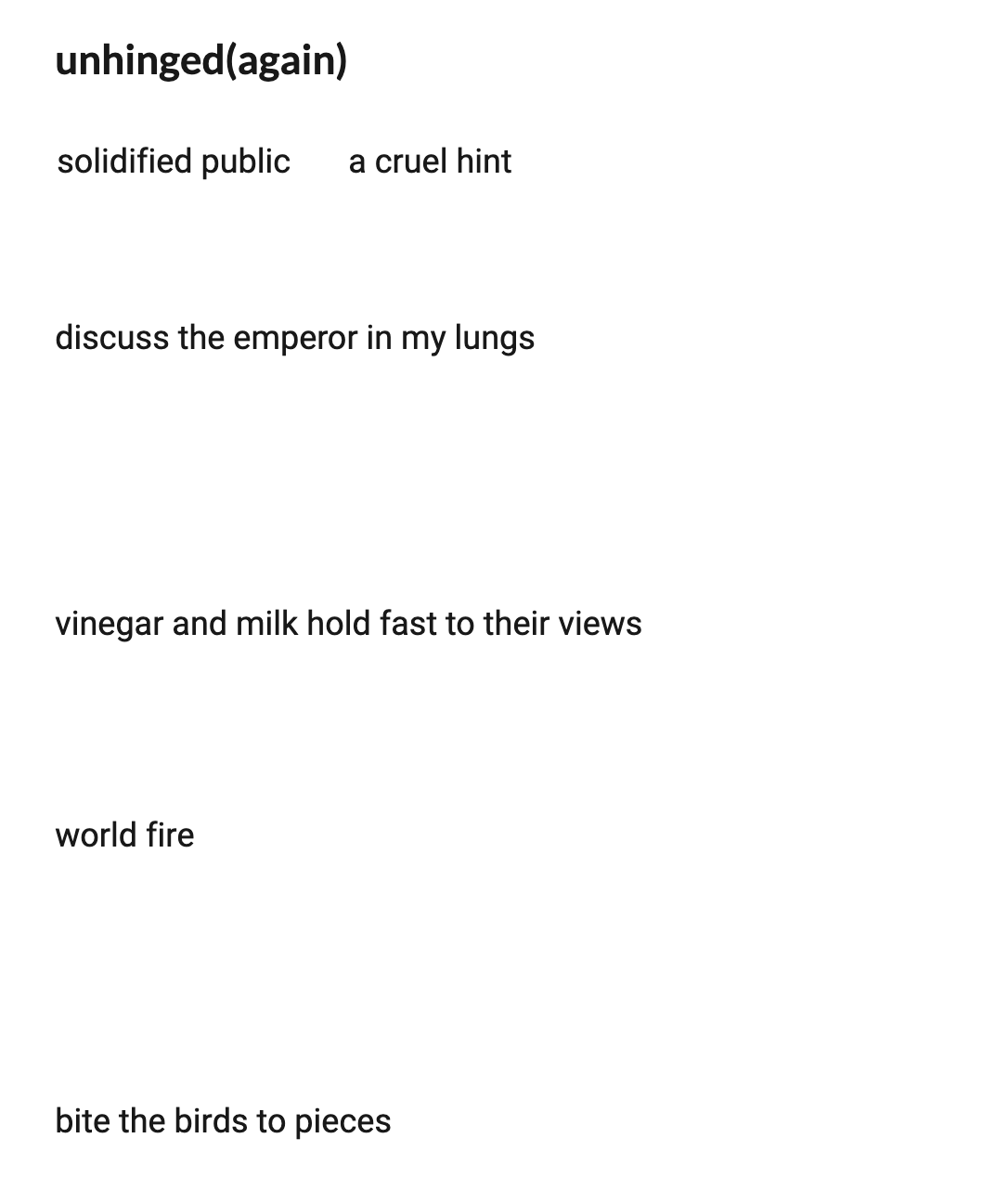Fall 2019 Writing Contest Winners
The theme is:

According to linguist Joan Corominas, the Spanish term duende originated as a contraction of the phrase dueño de casa (or duen de casa). Dueño means owner/possessor. So duendes are mischievous possessors; tener duende is to have spirit.
In “Juego y Teoría Del Duende,” Federico García Lorca writes: “Así, pues, el duende es un poder y no un obrar, es un luchar y no un pensar. Yo he oido decir a un viejo maestro guitarrista: El duende no está en la garganta; el duende sube por dentro desde la planta de los pies. Es decir, no es cuestión de facultad, sino de verdadero estilo vivo; es decir, de sangre; es decir, de viejísima cultura, de creación en acto.”
Susana Lezra translates this as: “And so, duende is a power not an act, a fight not a thought. I heard an old guitar master say: duende does not dwell in the throat; duende climbs up inside you, from the soles of the feet. This is to say, it is not a matter of faculty, but of live true style, of blood; that is, of ancient culture, of creating in action.”
We asked writers to give us their duende in under 650 words. The three finalists are below. Thank you, so much, to everyone who participated. We will announce the theme for our next contest in March.
1.
Daffodils Remind Us of Spring in Their Absence
& when i said, i worry about things i can’t control— i meant i have to keep reminding myself my mother is gone, or because she was, i have to keep forgetting. & in spite of the timer set on my life to write these words: i love my mother. would she still be here if i had loved myself a little? (what if i had loved myself more?). it is March & i smell her silence on my breath. how long do i have to eat an apple & its core? wild grief has a scent of roses— & i keep sleeping in other people’s clothing. do you ever love something so much you become it? do you measure twice & cut once—what a relief it was to pretend to heal. my story was this: she was happy, & i was sad (a boy’s mouth— of light growing as gradually as his hair over the unaware forest of flickering faces). & every time i look at her photographs, joy does another lap across the race track of my heart. they say i don’t deserve the word grief but really i’m loudly making a whole room fine with emptiness & flowers. a poem keeps me alive— & i eat paper & the empty sky is perfect. i stay afloat with the momentum of a story & my apartment is impossibly quiet—the copper envy of words my mouth can’t remember. i keep my distance & a song is the opposite of falling. how we fake to feel the magic inside us. it took me a while to understand that my mother remains a place where i found blood smells only of blood & a landscape where i knew i could be equal to the whole world & a birthday could be like an old cassette.
Ojo Taiye is a young Nigerian poet who uses poetry as a tool to hide his frustration with society. He is the winner of prestigious awards including the 2019 Kingdoms in the Wild Poetry Prize for his chapbook “All of Us Are Birds and Some of Us Have Broken Wings” and the 2019 Broken River Prize for his chapbook “Cotton Silence”, forthcoming in 2020. In 2019 he was shortlisted for the Brittle Paper Award for his poem “Surveillance Camera” which appeared in Tinderbox Poetry Journal. He was the winner of 2019 Hart Crane Poetry Prize, the Jack Grapes Poetry Prize, and others. His works appears and is forthcoming in Rattle, Notre Dame Review, Vallum, Temz Review, Palette Poetry, Glass Journal, Savant-Garde Journal, Glintmoon, Icefloe Press, Frontier Poetry, Strange Horizon, Cherry Tree, Willow Review, Cincinnati Review, Mary Journal, and others. You can reach out to him on twitter @ojo_poems.
1.
Daffodils Remind Us of Spring in Their Absence
& when i said, i worry about things i can’t control— i meant i have to keep reminding myself my mother is gone, or because she was, i have to keep forgetting. & in spite of the timer set on my life to write these words: i love my mother. would she still be here if i had loved myself a little? (what if i had loved myself more?). it is March & i smell her silence on my breath. how long do i have to eat an apple & its core? wild grief has a scent of roses— & i keep sleeping in other people’s clothing. do you ever love something so much you become it? do you measure twice & cut once—what a relief it was to pretend to heal. my story was this: she was happy, & i was sad (a boy’s mouth— of light growing as gradually as his hair over the unaware forest of flickering faces). & every time i look at her photographs, joy does another lap across the race track of my heart. they say i don’t deserve the word grief but really i’m loudly making a whole room fine with emptiness & flowers. a poem keeps me alive— & i eat paper & the empty sky is perfect. i stay afloat with the momentum of a story & my apartment is impossibly quiet—the copper envy of words my mouth can’t remember. i keep my distance & a song is the opposite of falling. how we fake to feel the magic inside us. it took me a while to understand that my mother remains a place where i found blood smells only of blood & a landscape where i knew i could be equal to the whole world & a birthday could be like an old cassette.
Ojo Taiye is a young Nigerian poet who uses poetry as a tool to hide his frustration with society. He is the winner of prestigious awards including the 2019 Kingdoms in the Wild Poetry Prize for his chapbook “All of Us Are Birds and Some of Us Have Broken Wings” and the 2019 Broken River Prize for his chapbook “Cotton Silence”, forthcoming in 2020. In 2019 he was shortlisted for the Brittle Paper Award for his poem “Surveillance Camera” which appeared in Tinderbox Poetry Journal. He was the winner of 2019 Hart Crane Poetry Prize, the Jack Grapes Poetry Prize, and others. His works appears and is forthcoming in Rattle, Notre Dame Review, Vallum, Temz Review, Palette Poetry, Glass Journal, Savant-Garde Journal, Glintmoon, Icefloe Press, Frontier Poetry, Strange Horizon, Cherry Tree, Willow Review, Cincinnati Review, Mary Journal, and others. You can reach out to him on twitter @ojo_poems.
2.
Poem In Which Secrets Are Revealed
There’s a story my father doesn’t
tell. Why he still calls himself an
alcoholic after two decades of detox.
They say alcoholism is hereditary
and I’m skeptical that DNA tracks our
weaknesses that way. But I believe in
weaknesses handed down. I’ve been
weak, leaned into weakness, and blamed
it on my early twenties. Untethered myself
from the things I cared for. Unraveled
those who had come to depend on
me. When I feel an urge these days,
I run away. On my lowest days, I just
collapse on the floor, the only thing
I understand. I am terrified of asking for
more. I am terrified of feeling broken
—being seen as a broken thing. My
greatest fear is suicide, which
is a way of saying I am terrified of being
left to my own devices. My second greatest
fear is that I will die before I understand
what it means to be happy.
jd hegarty is a poet, an anarchist, and a sunflower living in Saint Paul Minnesota with two loud grey cats. jd’s work can be found in Chronotope, White Stag, Crab Orchard Review, Mortar Magazine, and elsewhere. Their first chapbook, On Passing, was published by Red Bird Chapbooks in 2017. They can be reached at jdhegarty.com.
2.
Poem In Which Secrets Are Revealed
There’s a story my father doesn’t
tell. Why he still calls himself an
alcoholic after two decades of detox.
They say alcoholism is hereditary
and I’m skeptical that DNA tracks our
weaknesses that way. But I believe in
weaknesses handed down. I’ve been
weak, leaned into weakness, and blamed
it on my early twenties. Untethered myself
from the things I cared for. Unraveled
those who had come to depend on
me. When I feel an urge these days,
I run away. On my lowest days, I just
collapse on the floor, the only thing
I understand. I am terrified of asking for
more. I am terrified of feeling broken
—being seen as a broken thing. My
greatest fear is suicide, which
is a way of saying I am terrified of being
left to my own devices. My second greatest
fear is that I will die before I understand
what it means to be happy.
jd hegarty is a poet, an anarchist, and a sunflower living in Saint Paul Minnesota with two loud grey cats. jd’s work can be found in Chronotope, White Stag, Crab Orchard Review, Mortar Magazine, and elsewhere. Their first chapbook, On Passing, was published by Red Bird Chapbooks in 2017. They can be reached at jdhegarty.com.
3.
unhinged(again)
| solidified public | a cruel hint |
discuss the emperor in my lungs
vinegar and milk hold fast to their views
world fire
bite the birds to pieces

We are currently accepting written and visual submissions for our February issue.
The theme is:


